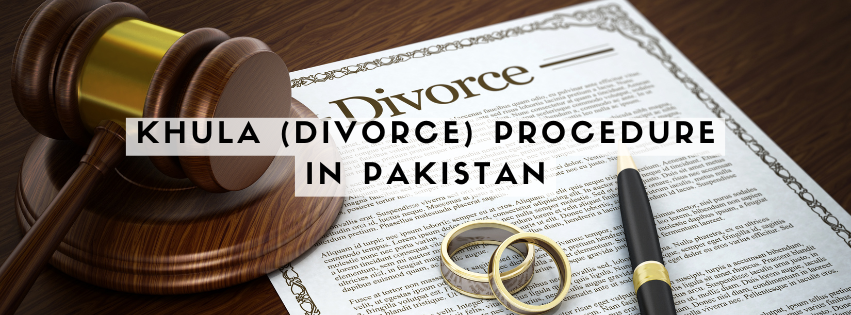How to Get Khula in Pakistan and Its Procedure

Online Khula Procedure in Pakistan The process of khula (divorce initiated by the wife) in Pakistan is outlined in The Muslim Family Laws Ordinance, 1961. This includes discussions on the khula laws and procedures in the country. Firstly, we need to understand what khula is. Khula is a process in which a wife can obtain a divorce from her husband through the family court. Under Muslim Family laws, the wife can make claims regarding her past and present maintenance expenses, child support monthly expenses, dower (mehar) and any gifted gold ornaments under Muslim Family Laws. An Overseas Pakistani woman can also file case for khula in Pakistan. The Difference Between Khula and Divorce in Pakistan A man pronouncing talaq or giving it in the form of a divorce document is referred to as It is termed ‘Talaq’ in Islam but a woman going to the court in Pakistan for seeking the divorce from her husband is known as Khula. Chelbale/ Khula is sought in circumstances when a woman wants to get rid of the marriage and her husband does not provide the divorce. In such situations, a woman can represent khula in Pakistani family court. When the wife seeks Khula, she is not violating any law rather she is exercising her rights given to her under Islam. How long does the Khula process take in Pakistan? With the help of Law of Lawyers team, the khula process is handled efficiently, ensuring that all legal formalities are completed as quickly as possible. Once we file the case in Family Court for khula, the process usually finalized within a month through our expert family lawyers. List of Documents Required for a Khula Case in Pakistan The list of documents needed to file a khula petition in the Family Court in Pakistan is straightforward: CNIC (ID Card Or Passport for Overseas Woman) of the wife seeking khula Copy of the Nikkah Nama or Marriage Certificate For An Overseas Woman: An overseas woman does not need to come to Pakistan for the purpose of khula because we are offering an online khula process specifically for our overseas women. With this service they can get khula decree through E-Court or by providing us a Special Power of Attorney. Khula Process for Pakistani Women Living Abroad (Overseas Woman) Now, if you are an overseas Pakistani woman you can easily pursue your legal rights in Pakistan which includes seeking khula (divorce). With the change in technology and other favorable legal cadre, Please tell us more about the process and its availablity to people in Pakistan. All the legal work is done for you as well, including the drafting and filing of the khula petition with the family court in Pakistan. We will interact with the competent bodies, act on your behalf in court and produce the khula court order. Relevant Case Law: (2012 LHC 2839) Pakistani Laws on Khula Pakistani law allows women in Pakistan to end their marriage through the process called khula, which is outlined in the Muslim Family Laws Ordinance of 1961. Unlike typical divorce where only the husband has the power, khula lets the wife start the divorce based on valid reasons. While the wife begins the khula, the husband can challenge it, defend against the reasons, or try to reconcile. But the husband cannot stop the khula, and his approval or signature is never needed to finalize the khula (divorce) – only the wife can choose to stop the khula or complete it. Related Case Law: (PLD 1959 Lahore 566) Islamic Laws On Khula Islamic Law recognizes khula as a legitimate form of divorce initiated by the wife, allowing her to seek separation from her husband if the marriage becomes unsustainable. The Holy Quran supports the concept of khula in Surah Al-Baqarah (2:229), which states that if a woman fears she cannot fulfill her marital duties, she may seek a separation by returning the dower (mehar). Grounds for Khula in Pakistan In the Islamic Family Laws Ordinance of 1961, for instance, a wife has the right to take khula if she has any reasonable grounds which make it difficult for the wife to stay with her husband. Discussed below are the grounds accepted for khula in Pakistan: Cruelty or Abuse Physical abuse or domestic violence. Emotional or mental abuse, including degrading treatment Lack of Maintenance The husband fails to provide financial support for his wife and children without a valid reason. Desertion The husband has abandoned the wife or failed to fulfill his marital obligations for an extended period. Incompatibility There is a lack of understanding, mutual respect, or compatibility between the husband and wife, making the marriage intolerable. Addiction The husband is addicted to drugs, alcohol, or other harmful substances that disrupt marital life. Infidelity The husband engages in extramarital affairs or adultery. Impotence The husband is impotent or unable to consummate the marriage, and this issue was concealed before marriage. Forcing Immoral Activities The husband compels the wife to engage in unethical or immoral activities. Religious Differences If the husband changes his religion or becomes irreligious, causing a conflict in beliefs. Polygamy The husband marries another woman without obtaining the wife’s consent or violates the conditions of polygamy as per law. Except of these few more grounds are acceptable in court if the ground is valid. Procedure for Khula in Pakistan The wife, often with a lawyer’s help, files a petition in the family court to start the khula process. The petition clearly explains the reasons for seeking khula, provides supporting evidence, and states the desired outcome. The court listens to both parties, considers the evidence, and may try to reconcile the marriage. In most cases, the court will approve the khula. If reconciliation fails, the court will issue a judgment. If the other party doesn’t attend the hearing, the judgment will be made in their absence. The court order is then taken to the Union Council, For a NADRA Divorce Certificate. Necessary Steps after Obtaining a Khula Decree
